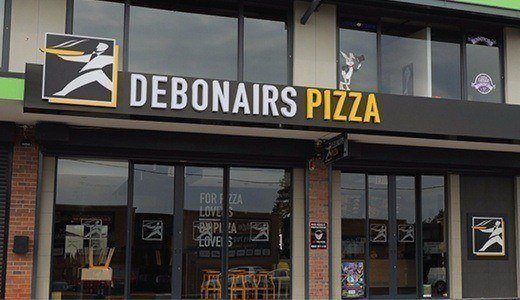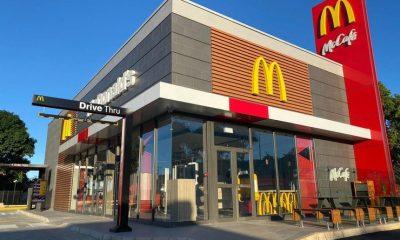Business
How Two KZN Students Cooked Up South Africa’s Pizza Powerhouse

From delivering in tuxedos to serving 27.5 million pizzas a year, Debonairs Pizza was born from a gap-year idea and two students’ grit.
Back in 1991, while most university students were worried about assignments and end-of-year exams, two young men in Pietermaritzburg were cooking up something else quite literally. Craig McKenzie and Andrew Harvey, both still studying at the time, had no idea they were laying the foundation for what would become South Africa’s biggest pizza franchise: Debonairs Pizza.
A Slice of Inspiration from Abroad
Craig McKenzie grew up on a dairy farm in Ixopo and matriculated from Maritzburg College. After army service, he took a gap year in the United States, a trip that would unexpectedly shape the future of South Africa’s fast food scene. In the US, McKenzie experienced something then-foreign to South Africa: home-delivered pizza.
At the time, South Africa was just emerging from the grip of apartheid, and the economy was still deeply segmented. Fast food options were mostly limited to burgers and fried chicken. The idea that “South Africans don’t eat pizza” was not just a common belief, it was a business deterrent.
But McKenzie saw opportunity. And when he returned home and enrolled at the University of Natal (now UKZN) to study Agricultural Economics, he brought that big idea with him.
The R6,000 Startup That Changed Everything
Partnering with Andrew Harvey, a Bachelor of Commerce student, McKenzie pooled together R6,000. The two young men started their pizza venture from the back of McKenzie’s brother’s bakery inside the Parklane Spar in Pietermaritzburg. They began trading after hours with a twist. Their delivery drivers wore tuxedos and bow ties, setting the tone for a brand that was both cheeky and professional.
On their very first night, they delivered just eight pizzas. Today? That number is closer to 27.5 million pizzas delivered per year, with over 2.2 million transactions annually.
A Franchise Grows Fast
Word spread. A second store opened in Umhlanga, then Durban, and soon after, Debonairs exploded. By 1996, there were 135 stores, and the Steers Group (now Famous Brands) acquired the franchise. A year later, Debonairs opened its first international branch in Manzini, Eswatini a bold move that also marked the introduction of vehicle deliveries.
By the late 1990s, Debonairs had earned the title of SA Franchisor of the Year and reached its 60th store. From there, growth was almost weekly. It wasn’t long before Debonairs was dominating the pizza scene.
The Brand That Keeps on Delivering
Today, Debonairs is the crown jewel in Famous Brands’ portfolio, which also includes Steers, Wimpy, and Mugg & Bean. According to the group’s 2025 financial results, Debonairs remains a major profit engine.
-
Revenue for the group hit R8.28 billion, with R7.63 billion coming from South Africa.
-
Operating profit rose 12.57%, and total profit climbed to R584.56 million.
-
Debonairs alone added 27 new stores in the past year, bringing its total to 868 across 16 countries.
That’s not just fast food that’s fast growth.
Craig McKenzie Today: Still Cooking Up Big Ideas
While Andrew Harvey has kept a low profile since the brand’s sale, McKenzie has remained a visible force in business. He and his wife now operate several restaurants under the Famous Brands umbrella, including Debonairs, Steers, and Mugg & Bean — from their home base on a sugar farm in Mid-Illovo. They also have offices in Durban and Gaborone.
Beyond pizza, McKenzie’s entrepreneurial spirit has led him into coffee (Equatorial Coffee Company), motorbikes (a Yamaha dealership in Botswana), eco-products (Nu Eco), and more.
His message to young entrepreneurs? “You don’t need to reinvent the wheel. It’s about taking best practices from proven brands and adding a unique perspective.”
A South African Legacy That Keeps Growing
In a country where load shedding, inflation, and youth unemployment continue to pose real challenges, stories like McKenzie and Harvey’s remind us of what’s possible when big ideas meet big hustle. South Africa may have doubted pizza once — but it no longer questions the power of belief, innovation, and some good old-fashioned dough.
Social media reaction? South Africans regularly show their love for Debonairs on platforms like TikTok and X (formerly Twitter) especially when a new flavour hits or the brand revisits its quirky marketing campaigns. As one post recently read, “Debonairs fed me through varsity. I owe them my degree!”
And honestly, they probably wouldn’t mind taking the credit.
{Source: BusinessTech}
Follow Joburg ETC on Facebook, Twitter , TikTok and Instagram
For more News in Johannesburg, visit joburgetc.com



























